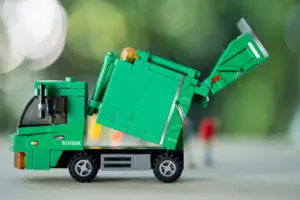
Dump and garbage trucks are ubiquitous on our roads. Both are vital to our communities—garbage trucks for maintaining sanitary living conditions and dump trucks to support construction projects that improve our quality of life.
Both are also large vehicles and sit higher off the ground than passenger vehicles. The number of them on the road and their sheer size make it inevitable that they will get into accidents with other vehicles. Unfortunately, these wrecks usually end badly for those in the other vehicle, both in terms of damage to the vehicle and injury to occupants.
Dump and Garbage Truck Accident Causes
Although dump and garbage trucks can get into the same types of accidents as other vehicles, there are some ways in which they are unique and accidents involving them often have different causes than passenger vehicles.
Poor Visibility
All vehicles have blind spots—areas around the vehicle that the driver cannot see either in their review or side view mirrors. Without the ability to see these areas, drivers may make lane changes or turns and inadvertently cause an accident with cars in adjacent lanes. Turning can also be dangerous if drivers do not clear their blind spots. Garbage and dump truck blind spots are larger than those in passenger cars because the large containers on the back of both types of trucks block the driver’s view in their rearview mirrors.
Passenger car drivers can check their blind spots by looking over their shoulders. It’s not so easy for big truck drivers. A truck’s height can make it difficult to see cars that are lower to the ground. Garbage trucks often face the added obstacle of having arms on the sides for lifting trash cans that may also obstruct the driver’s view of adjacent lanes.
While it is incumbent upon truck drivers to exercise extra caution, passenger vehicle drivers should keep these blind spots in mind and avoid driving in them.
Some companies have taken the step of adding backup cameras to their garbage or dump trucks. These are a proven way to avoid some types of accidents. But not all trucks are equipped with them and still face the problem of poor visibility.
Center of Gravity
Garbage and dump trucks tend to be top heavy. In addition, a dump truck’s load often rotates and if it is not properly loaded, the dump truck can be difficult to control when stopping or turning corners.
Expect More, Receive More: Legal Support That Feels Like Family
3 Tips for After a Dump Truck or Garbage Truck Accident
There are some things that you should do immediately after an accident with a dump truck or garbage truck and other things that you should do as your progress in your recovery.
1. Stay at the Scene
Florida law requires that anyone involved in a car accident remain at the scene until released by a police officer unless:
- No one was injured;
- There was no property damage; and
- No fatalities resulted from the crash.
In all other circumstances, you must remain there. It is highly unlikely in an accident with either a dump truck or garbage truck that there will be no property damage or injuries. Staying at the scene, in addition to being a legal obligation, is beneficial to you for several reasons.
Firstly, police officers will arrive on the scene and take photos, interview witnesses and victims (if victims are not too severely injured to participate), and prepare a report. You must obtain a copy of the police report. It may describe whom the police believe is at fault in any potential lawsuit and document where the vehicles ended up after the crash, as well as the extent of damage to all vehicles. You truck accident lawyer can help you do this.
If you or any occupants of your vehicle can do so, you or they should also take photographs of the scene and attempt to get the names of witnesses to the crash. If you file a lawsuit this information will help your attorney build your case and you will not have to wait for the police to release their report before your attorney can get started.
2. File Your PIP Claim
Under Florida’s no-fault insurance law, all licensed drivers are required to carry personal injury protection (PIP) coverage on their auto insurance plans. This coverage is intended to quickly reimburse drivers for damages they suffer in car accidents with minimum coverage amounts that are sufficient to pay for relatively minor accidents. You must act quickly because your claim has to be filed within 14 days of the accident to receive your benefits. Don’t wait around and miss this deadline or you will simply be out of luck and miss out entirely on this benefit you have been paying for monthly.
The law establishes minimum PIP coverage amounts as follows:
- Medical benefits – You must carry at least $10,000 in medical coverage. The plan will pay 80 percent of your medical expenses up to the maximum benefit amount. The good news about this benefit is that insurance companies must pay out within 30 days of the date the claim is submitted. That being said, the company has the right to investigate your claim for fraud for up to 60 days.
- Disability benefits – Your PIP policy will pay 60 percent of the wages you have lost if you are unable to work after a truck accident. The minimum policy benefit amount is, like medical benefits, $10,000. To verify your wages, your insurance company will likely ask you to provide a letter from your employer that shows your earnings over the last 13 weeks. Employers should be aware that they are required to provide this information, so don’t hesitate to ask them for it. If you can’t prove your income, you will not be paid disability benefits.
- Death benefits – Florida requires drivers to carry at least $5,000 in death benefit coverage. As is indicated by the name, death benefits are paid when a person dies in a car accident. Death benefits may be paid to the deceased person’s estate, their family members, or anyone else the court determines is entitled to them.
Here’s the thing to keep in mind about PIP, though. The Florida legislature left a hole in the law big enough to drive a dump truck through. It allows insurance companies to only pay 25 percent of your medical benefits if it determines that you did not have an “emergency medical condition” based on the type of injury you suffered and where you received medical care. Sounds crazy, doesn’t it? The law lets the insurance company determine whether or not you have a qualifying injury, regardless of whether or not you chose where or from whom you received care.
It’s possible to contest this determination, but you should seek the help of an experienced and competent truck accident attorney to fight for you against the insurance company’s attorneys, who make their living trying to pay out as little as possible.
3. Document Your Expenses
For both claiming PIP benefits and for proving any damages in a lawsuit, document all of your medical expenses. This includes the cost of ambulance transportation from the scene, your initial hospital stay (surgeon and other physician’s fees, medication, supplies, laboratory, X-rays, and surgery costs), as well as costs you incur after you’ve been discharged. Ongoing therapy costs, follow-up doctor appointments, subsequent surgeries, medication regimens, as well as medical equipment and devices you’re now required to use should all be documented.
It can be scary to open the mailbox and see a flood of medical bills you know you can’t afford to pay, but take a deep breath, open that box and then open the bills. Store them in a safe place so that you can provide them to your insurance company and your attorney. Any costs for which you don’t have documentation cannot be paid by PIP and will not be awarded by a jury or agreed to in pre-trial negotiations.
What Happens When PIP Isn’t Enough?

But there is hope. The law allows you to pursue a personal injury lawsuit against the person who caused your injuries. An experienced and competent dump truck and garbage truck accident attorney can evaluate your case and tell you if a lawsuit is appropriate based on the facts of your situation.
Filing a Personal Injury Lawsuit
If your injuries are serious and costly enough, a lawsuit may be the only way for you to recover the costs you’ve incurred. You may be wondering if you need an attorney to represent you in the lawsuit. The short answer is an emphatic yes—you need competent representation. You can bet that if insurance companies or the truck driver’s employer are involved, they will be lawyered up. Going it alone up against experienced attorneys who practice personal injury law every day is a poor choice. You need someone who understands this body of law, what damages you may be entitled to, and how to present your case to other attorneys in negotiation and, if necessary, to a jury.
Personal injury lawsuits are incredibly complex and take more than a single person to prepare for, investigate, and successfully resolve. Your case will likely require expert witnesses—medical professionals, accident reconstructionists, an actuary to calculate lost future wages, or a variety of others depending on the facts of your case. Your case may also require an investigator and is guaranteed to need a paralegal or legal secretary to take care of administrative tasks such as filing paperwork with the court. An experienced attorney will know who will be beneficial to your case and likely already have relationships with the kinds of people who will be helpful.
After You File
Filing your lawsuit is just the beginning of the process. As the wheels turn, there are several things your attorney may do on your behalf.
Negotiation
Most personal injury lawsuits are settled out of court and do not go all the way to a jury trial. Negotiation is critical. Choosing an attorney who has experience negotiating with insurance companies and who can take a firm stand for your rights is critical.
As your case progresses and your attorney and their team conduct an investigation, interview witnesses, and go over your documentation, facts may come to light that improve your negotiating position. Negotiations are not usually a one-and-done kind of thing. Presenting new information to the other party is a good way to potentially get them to up their settlement offer as their chances of winning at trial diminish. That’s why it’s always a good idea to keep the door open for future negotiations and why walking away from the table is usually a bad choice.
Taking Your Case to a Jury
Although most cases are settled through out-of-court negotiations, the ball is in your court when it comes to deciding whether to take an offer or go to trial. Your attorney can advise you about what they think your chances are at trial, but no result is ever guaranteed, and ultimately that choice always rests with you.
Selecting an attorney with courtroom experience is crucial, even if you may not need to take advantage of that experience. Litigation requires a skill set that not every attorney possesses. That set of skills is honed by practice and training. Your attorney needs to be intimately familiar with personal injury law, the rules of evidence and procedure, and the rules in the jurisdiction in which your lawsuit is filed.
It is just as important that your attorney know how to select and communicate effectively with a jury. There may be witnesses for the other side who seem sympathetic to jurors. How will your attorney question those witnesses? Are they skilled enough to break down medical or other scientific information into bits and pieces that jurors can understand? Can they tell a story—your story—effectively and convincingly?
Research your attorney. Check their background. Find client testimonials. Ask questions. Choosing a lawyer is a big decision and you need to make sure the person you choose is both capable and willing to help you out.
Fort Myers, FL 33919







